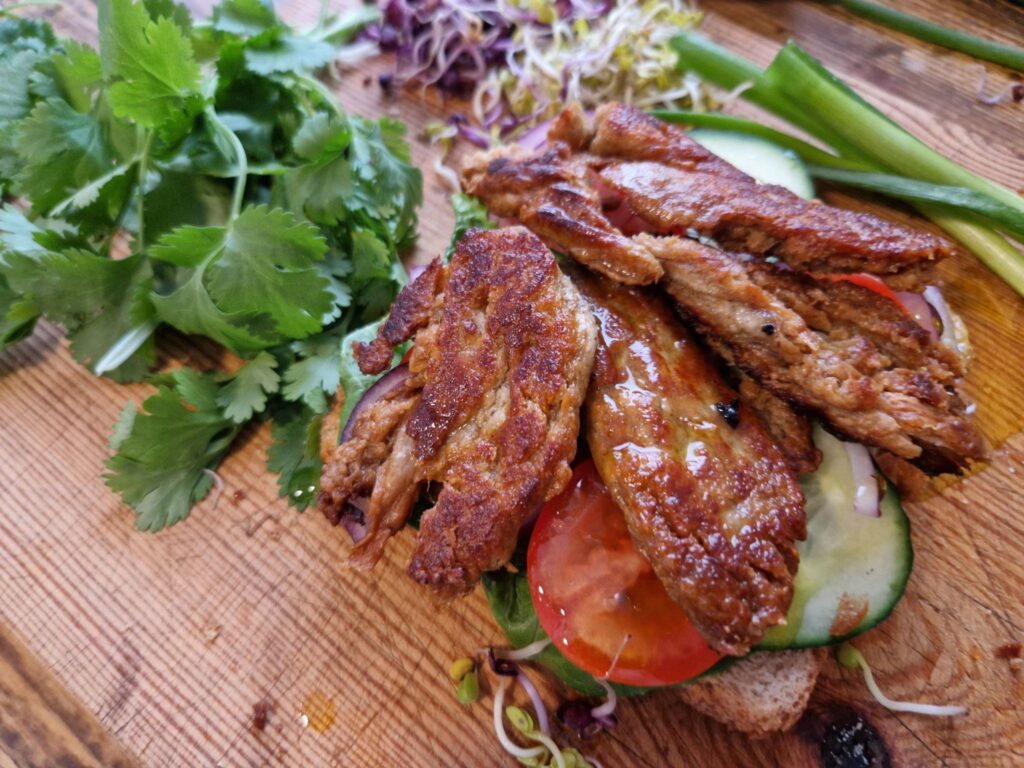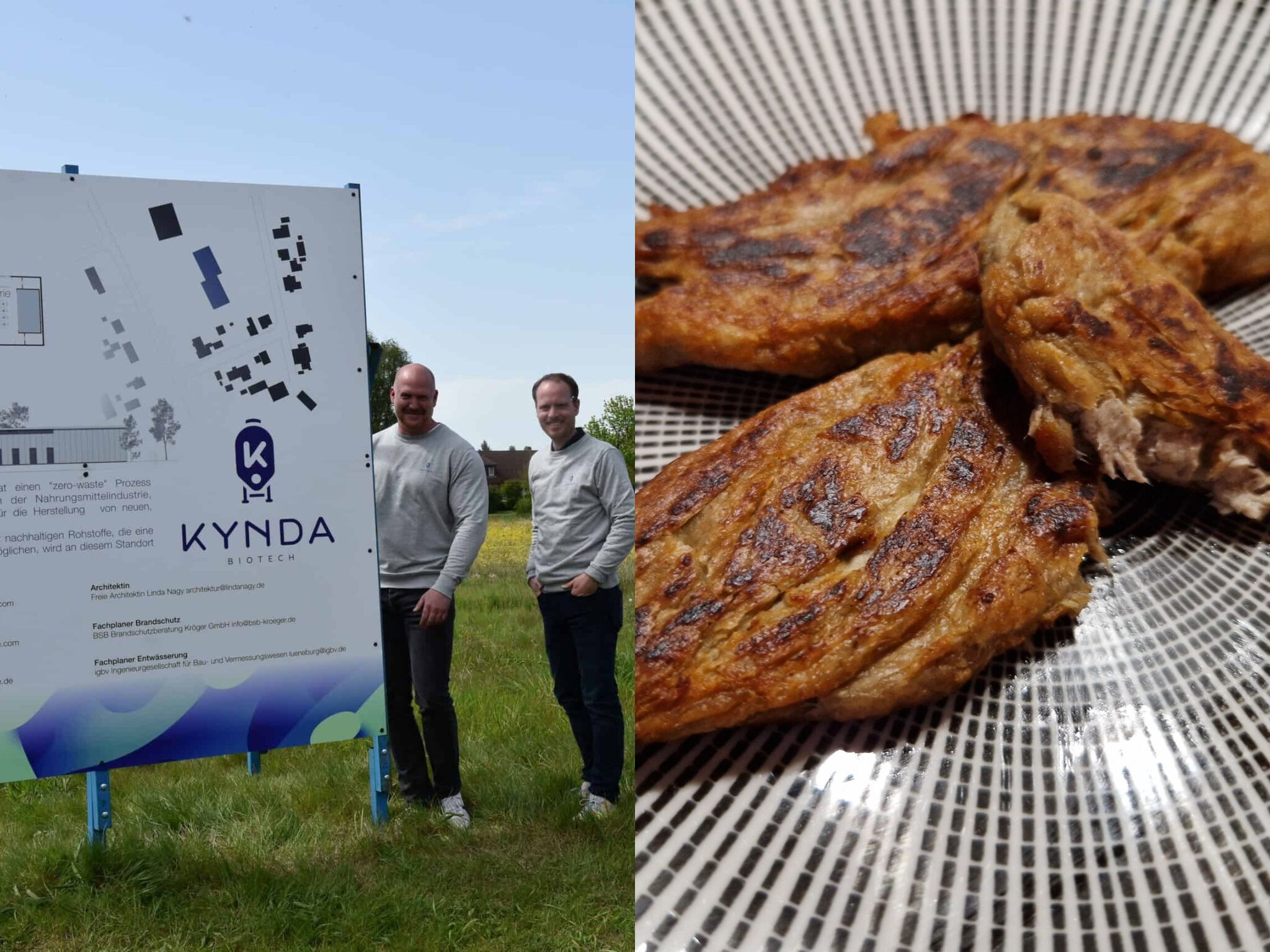Kynda is Building A Large-Scale Mycelium Facility to Turn Food Waste into Meat in 48 Hours
4 Mins Read
Germany’s Kynda has broken ground on a 6,200 sq m commercial facility that will allow it to produce 2,000 tonnes of mycelium meat each year.
Hamburg-based biotech startup Kynda, which makes plug-and-play bioreactors, starter cultures and mycelium protein ingredients, has begun work on a commercial facility to scale up production of its Kynda Meat.
The development comes two months after the company received planning permission for the new factory, a 6,200 sq m site with two production halls sprawling 720 sq m each. Equipped with 30,000 litres of fermentation capacity, the facility will allow Kynda to manufacture 2,000 tonnes of mycelium protein annually, which can be used to make products like chicken and pork analogues, and even dog food.
“We’ve outgrown our current lab and fermentation facilities which were, ironically, based in a former pig barn,” said CEO Daniel MacGowan von Holstein. “We’re therefore thrilled to witness the expansion of our production facilities to continue shaping the future of food production.”
Sustainable, nutritious and affordable mycelium meat

Founded in 2019 by von Holstein and COO Franziskus Schnabel, Kynda makes use of fungi and food industry sidestreams like soy-, oat- and rice-okara. These byproducts undergo a submerged biomass fermentation process, where microorganisms are rapidly grown in a liquid medium, and the entire biomass becomes the end product.
Alongside its proprietary process, Kynda’s fungal strain – which is already compliant with the EU’s novel foods regulations and presents no major regulatory hurdles – allows it to produce mycelium protein in just 48 hours, compared to seven to 10 days for the industry standard.
The resulting ingredient is a raw material that is cheaper to produce than plant-based texturates, and boasts environmental and nutritional aspects that will entice manufacturers. Kynda Meat emits 700% fewer greenhouse gas emissions than pea protein, an ingredient used by industry giants like Beyond Meat.
It also has a protein content of 37% in dry matter and comprises all nine essential amino acids. Plus, it’s low in fat, rich in fibre and vitamins, and allergen-free. These attributes make the meat suitable for use in both plant-based and hybrid meat applications.
“From the outset, our focus has been on crafting a product that is nutritious, sustainable, and accessible to consumers seeking environmentally conscious options,” said Schnabel.
Kynda Meat was unveiled at the Internorga trade fair in Hamburg in March, as part of a collaboration with plant-based pork producer The Raging Pig Company, which swapped 17% of the high-moisture-extruded pea protein in its burger with Kynda’s mycelium meat.
“By replacing highly processed raw materials with Kynda’s fermentation solution, we are answering the call of many consumers for healthy meat alternatives,” Raging Pig co-founder Arne Ewerbeck said at the time. He added that the partnership enabled his company to significantly lower production costs and be “finally able to compete with heavily subsidised meat producers”.
Kynda goes global as fungi protein flourishes

The mycelium burger patties showcased at the event served as a precursor to Kynda Meat’s market launch in Germany later this year, with further deals with B2C companies in both foodservice and retail soon to follow. Beyond Europe, Kynda is also in discussions with potential partners in Asia and North America.
“With the new production capacities, we strengthen our cooperation with industrial food companies and thus further expand our growth course – and respond to the increasing global demand for sustainable proteins,” said von Holstein.
Kynda is in the middle of a $4M seed funding round, and, last year, it received a non-dilutive grant from Germany’s food and agriculture ministry to scale up its fermentation platform and produce mycelium protein more efficiently. It’s one of several fungi protein producers in the country, including Nosh.bio, Bosque Foods and Infinite Roots (which closed a $58M Series B round in January, claimed to be the largest mycelium investment in Europe). Like Kynda, all these companies are valorising industry sidestreams.
Interest in fungi proteins has been expanding lately, with US mycelium producer Meati bagging $100M in Series C1 financing earlier this month, the biggest alternative protein investment since 2022. And last week, Finnish mycoprotein startup Enifer received €24M in new funding to build a commercial-scale factory.
Mycelium proteins have been acclaimed for their environmental and nutritional prowess, superior taste and texture, and potential to address food insecurity and global hunger. Companies like Kynda, which are leveraging agricultural byproducts, are advancing these claims by tackling food waste, which results in $1T in annual economic losses and contributes to 8-10% of global emissions.



